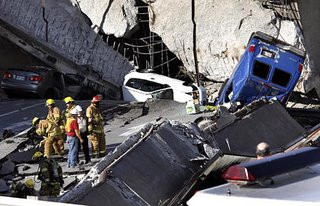 Submitted by Paul Ellis
Submitted by Paul EllisTraffic chaos reigned this morning for thousands of commuters in Laval, Quebec, a suburb north of Montreal, as they tried to drive into the city following the collapse of an overpass on a major thoroughfare this weekend. At least five people were crushed to death in their cars with the collapse of the overpass, their vehicles crushed so badly that--when lifted from the rubble--they barely reached the knees of one firefighter.
Three lanes of the overpass plus a pedestrian sidewalk collapsed onto Highway 19 about 1:00 p.m. EST Saturday. Four vehicles--a motorcycle, two cars and a minivan--were on the overpass at the time of the collapse. One witness said he noticed that the road sank an inch or two when he traveled over the overpass minutes earlier and he called emergency dispatchers. A crew was dispatched to pick up the concrete but they did not close the highway. The Transport Ministry did, however, send a message to journalists, warning that there were pieces of concrete on the ground. Minutes later, the structure failed.
Former Quebec premier Pierre Marc Johnson will head a public inquiry to determine exactly what went wrong but thus far officials have no explanation for how or why part of the overpass crumpled to the ground. In the wake of the fatal collapse in Quebec, Ontario and the city of Toronto plan to conduct special inspections on overpasses that are several decades old, and public recognition is growing that the nation's bridges are in desperate need of repair. The overpass that collapsed on Saturday was 36 years old, just over half its life expectancy of 70 years. The engineering community has long warned of an "infrastructure deficit," when projects ranging from water sewage systems to bridges are constructed but not properly maintained because of a lack of resources or planning.
Canadian governments, like those in the United States, have deferred critical transportation investments for years. Public concern in our area has grown recently through the ongoing debate over major renovation projects like the Seattle Viaduct and SR-520, all within the context of a catastrophic earthquake causing structural failure. Perhaps it won't take that big a shove to provoke failure in some of our older bridges or other structures; therefore, the investigation of the Laval collapse and the findings from the engineering review should be of more than passing interest for us, as well. Perhaps the time to act is shorter than we think...
Paul Ellis is lead staff for RAMP; an employee of the Tacoma-Pierce County Chamber, Ellis was the head of the Pierce County Transportation Advisory Committee (PCTAC), the community's largest transportation planning effort.





No comments:
Post a Comment